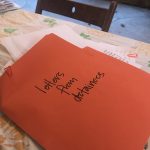Dear Future HIUS/ETHN 120D Student,
I am so glad you decided to take this class. Whether you are taking it as a major requirement, for general education, or just for fun, there is so much that this class will offer you! It’s up to you to make the most of what is in front of you and I would love to offer you my own experiences, as well as some suggestions as to how you might make the most of the class.
Over the course of the class, I worked with the group Detainee Allies. Things were a bit messy at the beginning, as Detainee Allies is a grassroots organization that doesn’t have an official meeting place, nor a set routine of the things they do. It took a few weeks to get the nitty gritty details of where I would be going and when, as well as how I would get there, sorted out, but I found that keeping an open mind and being flexible through the process made things a bit more manageable. These are important things to consider as you go into the class as you must not consider only yourself, but also the community partner you will be working with. As we are the ones stepping into these, it is important for us to be considerate and respectful towards those we partner with.
For me, most of what I have taken away from this class has come from weekly site visits. I emphasize “weekly site visits” because more than just visiting your community partners, I would suggest being frequent and consistent in doing so. I joined Detainee Allies at their weekly Monday night meetings, helping them read and send out letters. It was an amazing experience getting to participate in their work. I was intimidated at first because I didn’t really know anyone, but the folks there were very welcoming and the more I opened up to the group, the more I found myself beginning to form relationships with some of the established members. Forming relationships within your community partner may help you identify someone you can conduct an oral history with.
Building on the more technical parts of the class, such as the oral history project (as well as the readings and assignments), be sure to always give yourself enough time to do everything. The process of conducting an oral history was actually more time consuming than I expected. It is important to spend a good amount of time preparing for the interview. The actual interview itself and the interview transcription also take up a lot of time, so be prepared to put in a lot of work.
More than anything, remember that you will get what you put in. The more invested you are in the class and the work you do with your community partner, the more you will learn and the more fulfilling your experience(s) will be!
Wishing you a great quarter,
RJ Garcia





